Midweek Review
Missed opportunities!
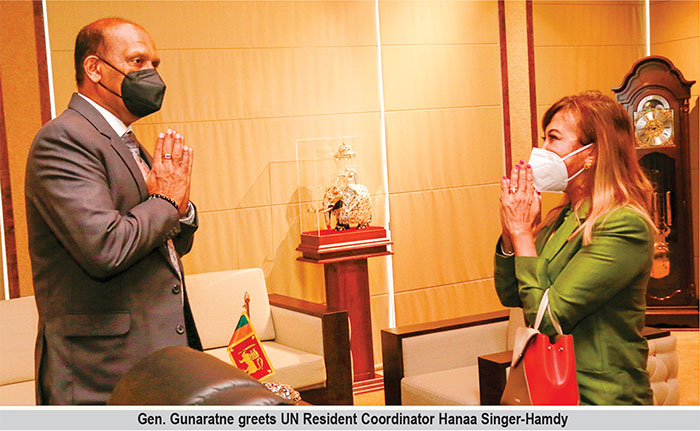
By Shamindra Ferdinando
UN Resident Coordinator in Colombo Hanna Singer-Hamdy paid a courtesy call on Defence Secretary (retd.) Gen. Kamal Gunaratne on Sept. 23 at the Defence Headquarters Complex, Sri Jayewardenepura, Kotte. The Egyptian was accompanied by the head of the United Nations Office on Drugs and Crime (UNODC) Alan Cole, formerly of the British Royal Navy.
The discussion covered Sri Lanka’s high profile ongoing campaign against narcotics trade and the government’s response to the raging Covid-19 epidemic.
A brief press release issued by Lt. Col. Nalin Herath, Officiating Director, Army Media Centre, in Sinhala, Tamil and English didn’t make reference to any other issue. Therefore, the writer rationally ascertained that no other matter had been taken up at the discussion.
Against the backdrop of the 48th session of the Geneva-based United Nations Human Rights Council (UNHRC) and the 76th session of the UNGA in New York, the Sri Lanka Podujana Peramuna (SLPP) government could have used the Sept. 23 meet to brief the UN Resident Coordinator Singer as regards the accountability process.
The Defence Secretary, on behalf of the government, could have handed over a comprehensive report to the top UN official in Sri Lanka, in response to one-sided and high-handed the war crimes agenda pursued by the UNHRC against the country. Unfortunately, the government didn’t. The failure on the part of the government to do so underscored the absence of a cohesive mechanism to counter the campaign targeting Sri Lanka. Shoddy handling of the accountability process is an affront to the war-winning military that sacrificed so much to fight and defeat, militarily, ‘the world’s worst terrorist outfit’. More than 12 years after the eradication of the Liberation Tigers of Tamil Eelam (LTTE), Sri Lanka remains under the UNHRC microscope, while many other countries, that caused death and misery to millions by launching false pretext wars or through illegal regime change actions are allowed to go scot-free.
For some strange reason, most probably for lack of competence at the Foreign Ministry, the government is reluctant to properly present Sri Lanka’s case before the international community. Let us hope that with Prof. G.L. Peiris, the eminent former law academic at the helm of the Foreign Ministry, we can mount a relentless diplomatic campaign to have the country cleared from such blatant accusations. In the process, it could even go to the extent of exposing, particularly our main accusers, who despite having plenty of innocent blood in their hands are pursuing this vendetta against us due to geo-political agendas.
The wartime General Officer Commanding (GoC) the elite 53 Division, the then Maj. Gen. Gunaratne could have meticulously briefed the UN Chief here, who, too, has had the audacity to make public comments on the country’s internal affairs and get away with such behaviour.
The author of ‘Road to Nanthikadal’, Gunaratne commanded one of the two fighting Divisions, the other being the 58 Division commanded by the present Army Commander, General Shavendra Silva, involved in the final phase of the offensive. It would be pertinent to mention that a battalion (4 Vijayabahu Infantry Regiment) that had been under the overall command of the then Maj. Gen. Gunaratne killed Prabhakaran. The 53 Division had been involved in the unprecedented Anandapuram battle (late March-early April 2009) along with 58 Division and Task Force 8 that dealt a massive blow to the LTTE.
Why didn’t the government exploit the Sept. 23 meet that took place the day after President Rajapaksa addressed the 76th session of the UNGA in New York?
Sri Lanka’s continuing failure to set the record straight should be examined taking into consideration UNHRC Chief Michelle Bachelet’s latest oral update on the situation in Sri Lanka (on Sept. 13), Foreign Minister Prof. G.L. Peiris’ response by Zoom to the former twice Chilean President Bachelet on the following day, President Rajapaksa’s meet with UNSG Antonio Guterres (on Sept. 19), President Rajapaksa’s address to the UNGA (Sept. 20) and three meetings Foreign Minister Prof. G.L. Peiris had with Commonwealth Secretary General Patricia Scotland, Australian Foreign Minister Marise Payne and Indian Foreign Minister Dr. S. Jaishankar also in New York.
The Defence Secretary is the ideal person to discuss the accountability issue. With Sri Lanka firmly on the UN agenda and the issue coming up for scrutiny once again at the 49th session in March 2022, the government cannot turn a blind eye to the developments taking place.
Vanni war compared with Ruwanda et al
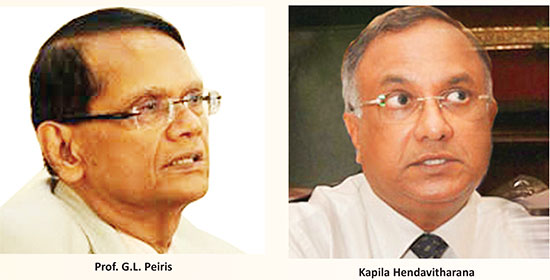 Antonio Guterres’s predecessor, Ban Ki-moon once compared the Vanni offensive with that of Ruwanda and Serbia genocides in the 1990s. Gunaratne strongly disputed Ban Ki-moon’s comparison of Vanni offensive with clear cut cases of genocide in those two countries
Antonio Guterres’s predecessor, Ban Ki-moon once compared the Vanni offensive with that of Ruwanda and Serbia genocides in the 1990s. Gunaratne strongly disputed Ban Ki-moon’s comparison of Vanni offensive with clear cut cases of genocide in those two countries
South Korean Ki-moon played his part to facilitate the Western agenda in spite of his own mission in Colombo contradicting unsubstantiated accusations.
The government owed an explanation why absolutely no attempt was made in Geneva or New York to challenge the unsubstantiated war crimes allegations that paved the way for Western powers and other interested parties to place Sri Lanka on the Geneva agenda.
Instead of setting the record straight, President Rajapaksa assured his readiness to work with domestic stakeholders, international partners, UN, civil society and Tamil expatriate groups, whereas FM Peiris reiterated Sri Lanka’s commitment to some key provisions in the resolution co-sponsored by the then Yahapalana government in 2015 as fait accompli, while strongly rejecting external interventions.
In separate meetings with Aussie Foreign Minister Patricia, Scotland Marise Payne and Indian counterpart Dr. Jaishankar, Prof. Peiris explained ground realities and the hostile approach adopted by interested parties. Prof. Peiris also elucidated to Scotland the wrongness in replacing domestic accountability mechanisms with external bodies, particularly the ad-hoc mechanism approved at the 46th Geneva session.
Bachelet declared in her Sept. 13 speech that the UNHRC was going ahead with the investigation. Sri Lanka shouldn’t expect Scotland to take a stand favourable to Sri Lanka, under any circumstances, as the organisation Bachelet leads conveniently turned a Nelsonian eye to Indian sponsored terrorism that ravaged Sri Lanka. Did Commonwealth ever take a stand on the destabilisation of the smaller neighbour by the Commonwealth giant?
Prof. G.L. Peiris told his Australian counterpart Marise Payne how Bachelet followed a policy extremely detrimental to Sri Lanka as regards the accountability process. A Foreign Ministry press release quoted Prof. Peiris as having told Payne: “….there is a need to allow local institutions the space and opportunity to carry out their mandates and the establishment of an ad-hoc external mechanism that overrides this work is unnecessary and detrimental. It is premature and inappropriate to have a mechanism selectively targeting Sri Lanka that goes against the very principles of the UN Charter.”
Australia is aware of the Geneva project meant to undermine Sri Lanka. Regardless of close bilateral relations between Australia and Sri Lanka, the former will abide by the US position vis-a-vis Sri Lanka. The Australian policy should be examined, keeping in mind its role in the US-led alliances against China and extremely close relationship between Sri Lanka and China, the emerging world power.
The surprise Australia, the UK and the US (AUKUS) alliance struck recently, at the expense of France, on supplying a nuclear powered submarine fleet to their colonial cousin Australia should be an example of the old adage that blood is thicker than water.
The new three nation Anglo-Saxon alliance suddenly arrayed against China should also serve as a warning to New Delhi that it is already an odd partner, though one of the earliest to sign up for Quad, comprising the US, Japan, India and Australia ranged against China. If they could ditch long standing European ally France without batting an eye lid, Delhi can imagine how they will treat her if they suddenly see India too as a rival like China.
French Foreign Minister Jan-Yves Le Drian went to the extent of alleging US President Joe Biden of stabbing France in the back.
“It’s really a stab in the back. We had established a relationship of trust with Australia, this trust has been betrayed”, Foreign Minister Jean-Yves Le Drian told France Info radio. “I’m very angry today, and bitter… this is not something allies do to each other”, he said, noting that Australia would now have to explain how it would exit the contract.
A lesson for France
So Sri Lanka should not depend on foreign powers, entirely. It would be Sri Lanka’s responsibility to present its case before the global community. Major Western powers will never take a stand in support of a smaller nation at the expense of their overall strategy and lucrative business interests, the only exception being the case of Israel. There cannot be a better example than Australia going back on an agreement with France for what it considered a much better arrangement for Canberra. Obviously, not only Biden but the British and Australian leaders, too, stabbed France in the back.
In his talks with Dr. Jaishankar, Prof. Peiris declared Sri Lanka couldn’t accept external mechanisms active on the ground whereas the Indian Minister underscored the need for a fair and just resolution of residual issues in the interest of both countries.
Sri Lanka seems trapped in the eneva machinations. India, too, should be wary as its much touted relationship with the US does not mean a thing if one examined the way the US, the British and Australians sprang quite a despicable surprise.
Hope the world hasn’t forgotten how the US discarded Pakistan after having used the country in its proxy war to oust the Soviet Union from Afghanistan and to intimidate India when it was seen as being in Soviet camp. New Delhi remained noncommittal regarding the Soviet invasion of Afghanistan.
In fact, Indian destabilisation of Sri Lanka, in the 80s, is in line with its overall strategy to counter domestic threats emanating from Tamil Nadu in the backdrop of perceived threat of Sri Lanka being a base for US-Israeli operations.
However, for want of cohesive policy Sri Lanka, at least after the end of the war hadn’t made a genuine effort to set the record straight.
Prof. Peiris during his interactions with foreign dignitaries, has quite clearly explained Sri Lanka’s refusal to accept external mechanisms. President Rajapaksa, too, stressed the importance of domestic mechanisms in achieving reconciliation. Both the President and the Foreign Minister declared Sri Lanka’s readiness to work with domestic stakeholders, including the civil society, Tamil expatriate groups, international partners and the UN to accomplish genuine peace.
Pompeo on Shavendra
However, the incumbent government has so far failed to question the very basis for domestic mechanisms set up by the previous government on the strength of unsubstantiated allegations. The government owed an urgent explanation. There cannot be any excuse for not presenting a proper defense on behalf of the war-winning armed forces. Commander of the Army Gen. Shavendra Silva remains blacklisted by the US on unsubstantiated allegations. Let me reproduce the former US Secretary of State Mike Pompeo declaration on Feb 14, 2020: “I am designating Shavendra Silva making him ineligible for entry into the U.S. due to his involvement in extrajudicial killings during Sri Lanka’s Civil War. The U.S. will not waver in its pursuit of accountability for those who commit war crimes and violate human rights.”
The US made the announcement after President Gotabaya Rajapaksa named Silva the Chief of Defence Staff (CDS). Another Gajaba Regiment veteran Chagie Gallage highlighted Sri Lanka’s pathetic failure to defend the military when he retired on August 31, 2018.
There had never been a previous instance of a senior officer in his farewell speech questioning the overall failure to counter the foreign project. This happened at Saliyapura, the famed Gajaba Regimental Headquarters.
He said: “Gajaba is engraved in golden letters in the annals of the Sri Lanka Army’s history, if not in the history of Sri Lanka … and I’m certain it will never be reversed by any. So, I’m happy to be retired being a tiny particle of that proud chapter of the history, though designated as a ‘War Criminal”.
About 10 months before Gallage’s retirement, Lord Naseby made a stunning revelation in the House of Lords. On the basis of hitherto confidential dispatches from the British High Commission in Colombo, during January-May 2009, the Conservative politician contradicted the very basis of the three-member Darusman report. This report, released on March 31, 2011, had been the primary reason for the 2015 accountability resolution that faulted the Sri Lanka Army.
The World War 11 fighter pilot fought a near three-year battle with the British administration to secure the confidential dispatches and was finally able to obtain a highly redacted version to contradict the lies in the second week of Oct 2017. Although the then Foreign Minister Tilak Marapana, PC, in his address to the UNHRC made a reference to Lord Naseby’s revelations, Sri Lanka has so far not requested Geneva to examine the British dispatches.
The author of British dispatches Lt. Col. Anthony Gash has never challenged the authenticity of heavily censored dispatches disclosed by Lord Naseby.
Sri Lanka earlier squandered a similar golden opportunity to make a strong case for a revisit of the Darusman report in June 2011. The then US Defence Advisor in Colombo Lt. Col. Lawrence Smith quite convincingly defended the Sri Lanka Army at the 2011 Colombo Defence Seminar. The American contradicted unsubstantiated allegations raised by a retired Indian Major General Ashok K. Metha, formerly of the IPKF. Lt. Col. Smith must have made that declaration, based on information available to the US Embassy in Colombo as well as other dispatches from our war zone. And most importantly, the American officer made the declaration within three months after the releasing of the Darusman report. Sri Lanka is yet to use British and American dispatches in her defence.
Western powers continue to harass Sri Lanka on the basis of unsubstantiated war crimes accusations. Bachelet’s move to further investigate Sri Lanka should be challenged as the previous accusations that led to the 2015 Geneva resolution remained uninvestigated.
According to the Darusman report (paragraph 23: Confidentiality of the Panel’s records), the accusations cannot be examined till 2031. This strange stipulation has a further clause stating that the time bar could be extended for a further period. We must be the only country not allowed to see our accusers or the case against us for so long! But, successive governments never took the entire gamut of issues into consideration before making representations on behalf of the country. The incumbent SLPP is no exception. In spite of repeated vows to defend the armed forces, the SLPP had pathetically failed in its duty and responsibility.
Predicament of former SLAF Chief
As a result of sheer negligence, Sri Lanka has ended up being categorised as a perpetrator of war crimes, and those who had fought for the country are targeted. There cannot be a better example than Air Marshal Sumangala Dias who suffered due to Sri Lanka’s failure. Canada refused to accept Dias as Sri Lanka’s High Commissioner though the former Sri Lanka Air Force Commander is not under human rights scrutiny. Subsequently, the government proposed Dias as Sri Lanka’s Ambassador to Italy. However, we are yet unaware of Italy’s position. Italy as a member state of the EU, pursuing war crimes accusations against Sri Lanka, may not accept the retired SLAF Chief.
Prominent civil society activist Harsha Kumara Navaratne has quit the Human Rights Commission to take over the country’s mission in Ottawa. The former head of the NGO Seva Lanka, with his experience with the HRC, hopefully would be able to improve Sri Lanka’s image in Canada. The decision to name former minister Mahinda Samarasinghe as Sri Lanka’s Ambassador in Washington, too, is an interesting development. Samarasinghe handled human rights and related matters during Mahinda Rajapaksa’s presidency and was part of Sri Lanka’s delegation to Geneva. Perhaps the government expects missions in Washington (non- career diplomat), Ottawa (non- career diplomat) and London manned by career diplomat Saroja Sirisena to improve the ground situation. New Delhi should be part of the operation. Milinda Moragoda, who had served Ranil Wickremesinghe’s government as a Cabinet minister before switching allegiance to Mahinda Rajapaksa, recently took over the New Delhi mission. So, we now have two former ministers as heads of missions in New Delhi and Washington and prominent civil society activist in Ottawa.
Samarasinghe last served as the Ports and Shipping Minister. Having succeeded Arjuna Ranatunga (UNP), Samarasinghe, who represented the SLFP at that time, signed the 99-year-lease on the Hambantota port. Navaratne quit Seva Lanka chairmanship last month having disengaged from the NGO’s activity, beginning January this year. Navaratne’s appointment is in line with the government entering into a dialogue with the local civil society as well as President Gotabaya Rakapaksa’s declaration in New York his readiness to talk with Tamil expatriate groups. Whatever, the SLPP government does, it should set up a mechanism, without further delay, to counter those propagating lies in support of the Geneva project.
A role for ex-CNI
Perhaps former Chief of National Intelligence (CNI), Maj. Gen. Kapila Hendavitharana can be engaged to work out a proper strategy. Intelligence veteran Hendavitharana can be part of a special team assigned to build a strong case on behalf of the country on the basis of available information.
The information unintentionally made available by those pursuing war crimes probe can be quite useful to Sri Lanka as they are astonishing. Let there be a meticulous study of statements, accusations, documents and reports pertaining to accountability issues. Bachelet rushing to accuse the Sri Lanka Army of being responsible for so-called mass graves in Mannar, discovered in 2019, exposed the irresponsible conduct of the Geneva body, when a reputed US lab determined that those remains belonged to the colonial era.
Bachelet obviously acted on information provided by some Colombo-based diplomatic missions. There is no doubt that the British HC and the German Embassy in Colombo (both members of the self-appointed Sri Lanka Core Group in Geneva) influenced Bachel’s decision.
Due to petty political backbiting, Sri Lanka then lacked the political will to expose the Geneva project. As the simmering controversy over Mannar mass graves erupted during the yahapalana administration, the Foreign Ministry conveniently remained silent. That was nothing but treacherous behaviour and the Ministry, as one of the most important institutions, should be ashamed.
Sri Lanka didn’t have the guts to use Bachelet’s irresponsible conduct to challenge the overall process. Had there been a proper review of facts, since the change of government in Nov 2019, Gen. Gunaratne could have exploited his meeting with Hanaa Singer-Hamdy.
Features
Handunnetti and Colonial Shackles of English in Sri Lanka

“My tongue in English chains.
I return, after a generation, to you.
I am at the end
of my Dravidic tether
hunger for you unassuaged
I falter, stumble.”
– Indian poet R. Parthasarathy
 When Minister Sunil Handunnetti addressed the World Economic Forum’s ‘Is Asia’s Century at Risk?’ discussion as part of the Annual Meeting of the New Champions 2025 in June 2025, I listened carefully both to him and the questions that were posed to him by the moderator. The subsequent trolling and extremely negative reactions to his use of English were so distasteful that I opted not to comment on it at the time. The noise that followed also meant that a meaningful conversation based on that event on the utility of learning a powerful global language and how our politics on the global stage might be carried out more successfully in that language was lost on our people and pundits, barring a few commentaries.
When Minister Sunil Handunnetti addressed the World Economic Forum’s ‘Is Asia’s Century at Risk?’ discussion as part of the Annual Meeting of the New Champions 2025 in June 2025, I listened carefully both to him and the questions that were posed to him by the moderator. The subsequent trolling and extremely negative reactions to his use of English were so distasteful that I opted not to comment on it at the time. The noise that followed also meant that a meaningful conversation based on that event on the utility of learning a powerful global language and how our politics on the global stage might be carried out more successfully in that language was lost on our people and pundits, barring a few commentaries.
Now Handunnetti has reopened the conversation, this time in Sri Lanka’s parliament in November 2025, on the utility of mastering English particularly for young entrepreneurs. In his intervention, he also makes a plea not to mock his struggle at learning English given that he comes from a background which lacked the privilege to master the language in his youth. His clear intervention makes much sense.
The same ilk that ridiculed him when he spoke at WEF is laughing at him yet again on his pronunciation, incomplete sentences, claiming that he is bringing shame to the country and so on and so forth. As usual, such loud, politically motivated and retrograde critics miss the larger picture. Many of these people are also among those who cannot hold a conversation in any of the globally accepted versions of English. Moreover, their conceit about the so-called ‘correct’ use of English seems to suggest the existence of an ideal English type when it comes to pronunciation and basic articulation. I thought of writing this commentary now in a situation when the minister himself is asking for help ‘in finding a solution’ in his parliamentary speech even though his government is not known to be amenable to critical reflection from anyone who is not a party member.
The remarks at the WEF and in Sri Lanka’s parliament are very different at a fundamental level, although both are worthy of consideration – within the realm of rationality, not in the depths of vulgar emotion and political mudslinging.
The problem with Handunnetti’s remarks at WEF was not his accent or pronunciation. After all, whatever he said could be clearly understood if listened to carefully. In that sense, his use of English fulfilled one of the most fundamental roles of language – that of communication. Its lack of finesse, as a result of the speaker being someone who does not use the language professionally or personally on a regular basis, is only natural and cannot be held against him. This said, there are many issues that his remarks flagged that were mostly drowned out by the noise of his critics.
Given that Handunnetti’s communication was clear, it also showed much that was not meant to be exposed. He simply did not respond to the questions that were posed to him. More bluntly, a Sinhala speaker can describe the intervention as yanne koheda, malle pol , which literally means, when asked ‘Where are you going?’, the answer is ‘There are coconuts in the bag’.
He spoke from a prepared text which his staff must have put together for him. However, it was far off the mark from the questions that were being directly posed to him. The issue here is that his staff appears to have not had any coordination with the forum organisers to ascertain and decide on the nature of questions that would be posed to the Minister for which answers could have been provided based on both global conditions, local situations and government policy. After all, this is a senior minister of an independent country and he has the right to know and control, when possible, what he is dealing with in an international forum.
This manner of working is fairly routine in such international fora. On the one hand, it is extremely unfortunate that his staff did not do the required homework and obviously the minister himself did not follow up, demonstrating negligence, a want for common sense, preparedness and experience among all concerned. On the other hand, the government needs to have a policy on who it sends to such events. For instance, should a minister attend a certain event, or should the government be represented by an official or consultant who can speak not only fluently, but also with authority on the subject matter. That is, such speakers need to be very familiar with the global issues concerned and not mere political rhetoric aimed at local audiences.
Other than Handunnetti, I have seen, heard and also heard of how poorly our politicians, political appointees and even officials perform at international meetings (some of which are closed door) bringing ridicule and disastrous consequences to the country. None of them are, however, held responsible.
Such reflective considerations are simple yet essential and pragmatic policy matters on how the government should work in these conditions. If this had been undertaken, the WEF event might have been better handled with better global press for the government. Nevertheless, this was not only a matter of English. For one thing, Handunnetti and his staff could have requested for the availability of simultaneous translation from Sinhala to English for which pre-knowledge of questions would have been useful. This is all too common too. At the UN General Assembly in September, President Dissanayake spoke in Sinhala and made a decent presentation.
The pertinent question is this; had Handunetti had the option of talking in Sinhala, would the interaction have been any better? That is extremely doubtful, barring the fluency of language use. This is because Handunnetti, like most other politicians past and present, are good at rhetoric but not convincing where substance is concerned, particularly when it comes to global issues. It is for this reason that such leaders need competent staff and consultants, and not mere party loyalists and yes men, which is an unfortunate situation that has engulfed the whole government.
What about the speech in parliament? Again, as in the WEF event, his presentation was crystal clear and, in this instance, contextually sensible. But he did not have to make that speech in English at all when decent simultaneous translation services were available. In so far as content was concerned, he made a sound argument considering local conditions which he knows well. The minister’s argument is about the need to ensure that young entrepreneurs be taught English so that they can deal with the world and bring investments into the country, among other things. This should actually be the norm, not only for young entrepreneurs, but for all who are interested in widening their employment and investment opportunities beyond this country and in accessing knowledge for which Sinhala and Tamil alone do not suffice.
As far as I am concerned, Handunetti’s argument is important because in parliament, it can be construed as a policy prerogative. Significantly, he asked the Minister of Education to make this possible in the educational reforms that the government is contemplating.
He went further, appealing to his detractors not to mock his struggle in learning English, and instead to become part of the solution. However, in my opinion, there is no need for the Minister to carry this chip on his shoulder. Why should the minister concern himself with being mocked for poor use of English? But there is a gap that his plea should have also addressed. What prevented him from mastering English in his youth goes far deeper than the lack of a privileged upbringing.
The fact of the matter is, the facilities that were available in schools and universities to learn English were not taken seriously and were often looked down upon as kaduwa by the political spectrum he represents and nationalist elements for whom the utilitarian value of English was not self-evident. I say this with responsibility because this was a considerable part of the reality in my time as an undergraduate and also throughout the time I taught in Sri Lanka.
Much earlier in my youth, swayed by the rhetoric of Sinhala language nationalism, my own mastery of English was also delayed even though my background is vastly different from the minister. I too was mocked, when two important schools in Kandy – Trinity College and St. Anthony’s College – refused to accept me to Grade 1 as my English was wanting. This was nearly 20 years after independence. I, however, opted to move on from the blatant discrimination, and mastered the language, although I probably had better opportunities and saw the world through a vastly different lens than the minister. If the minister’s commitment was also based on these social and political realities and the role people like him had played in negating our English language training particularly in universities, his plea would have sounded far more genuine.
If both these remarks and the contexts in which they were made say something about the way we can use English in our country, it is this: On one hand, the government needs to make sure it has a pragmatic policy in place when it sends representatives to international events which takes into account both a person’s language skills and his breadth of knowledge of the subject matter. On the other hand, it needs to find a way to ensure that English is taught to everyone successfully from kindergarten to university as a tool for inclusion, knowledge and communication and not a weapon of exclusion as is often the case.
This can only bear fruit if the failures, lapses and strengths of the country’s English language teaching efforts are taken into cognizance. Lamentably, division and discrimination are still the main emotional considerations on which English is being popularly used as the trolls of the minister’s English usage have shown. It is indeed regrettable that their small-mindedness prevents them from realizing that the Brits have long lost their long undisputed ownership over the English language along with the Empire itself. It is no longer in the hands of the colonial masters. So why allow it to be wielded by a privileged few mired in misplaced notions of elitism?
Features
Finally, Mahinda Yapa sets the record straight

Clandestine visit to Speaker’s residence:
Finally, former Speaker Mahinda Yapa Abeywardena has set the record straight with regard to a controversial but never properly investigated bid to swear in him as interim President. Abeywardena has disclosed the circumstances leading to the proposal made by external powers on the morning of 13 July, 2022, amidst a large scale staged protest outside the Speaker’s official residence, situated close to Parliament.
Lastly, the former parliamentarian has revealed that it was then Indian High Commissioner, in Colombo, Gopal Baglay (May 2022 to December 2023) who asked him to accept the presidency immediately. Professor Sunanda Maddumabandara, who served as Senior Advisor (media) to President Ranil Wickremesinghe (July 2022 to September 2024), disclosed Baglay’s direct intervention in his latest work, titled ‘Aragalaye Balaya’ (Power of Aragalaya).
Prof. Maddumabandara quoted Abeywardena as having received a startling assurance that if he agreed to accept the country’s leadership, the situation would be brought under control, within 45 minutes. Baglay had assured Abeywardena that there is absolutely no harm in him succeeding President Gotabaya Rajapaksa, in view of the developing situation.
The author told the writer that only a person who had direct control over the violent protest campaign could have given such an assurance at a time when the whole country was in a flux.
One-time Vice Chancellor of the Kelaniya University, Prof. Maddumabandara, launched ‘Aragalaye Balaya’ at the Sri Lanka Foundation on 20 November. In spite of an invitation extended to former President Gotabaya Rajapaksa, the ousted leader hadn’t attended the event, though UNP leader Ranil Wickremesinghe was there. Maybe Gotabaya felt the futility of trying to expose the truth against evil forces ranged against them, who still continue to control the despicable agenda.
Obviously, the author has received the blessings of Abeywardena and Wickremesinghe to disclose a key aspect in the overall project that exploited the growing resentment of the people to engineer change of Sri Lankan leadership.
The declaration of Baglay’s intervention has contradicted claims by National Freedom Front (NFF) leader Wimal Weerawansa (Nine: The hidden story) and award-winning writer Sena Thoradeniya (Galle Face Protest: System change for anarchy) alleged that US Ambassador Julie Chung made that scandalous proposal to Speaker Abeywardena. Weerawansa and Thoradeniya launched their books on 25 April and 05 July, 2023, at the Sri Lanka Foundation and the National Library and Documentation Services Board, Independence Square, respectively. Both slipped in accusing Ambassador Chung of making an abortive bid to replace Gotabaya Rajapaksa with Mahinda Yapa Abeywardena.
Ambassador Chung categorically denied Weerawansa’s allegation soon after the launch of ‘Nine: The hidden story’ but stopped short of indicating that the proposal was made by someone else. Chung had no option but to keep quiet as she couldn’t, in response to Weerawansa’s claim, have disclosed Baglay’s intervention, under any circumstances, as India was then a full collaborator with Western designs here for its share of spoils. Weerawansa, Thoradeniya and Maddumabandara agree that Aragalaya had been a joint US-Indian project and it couldn’t have succeeded without their intervention. Let me reproduce the US Ambassador’s response to Weerawansa, who, at the time of the launch, served as an SLPP lawmaker, having contested the 2020 August parliamentary election on the SLPP ticket.
“I am disappointed that an MP has made baseless allegations and spread outright lies in a book that should be labelled ‘fiction’. For 75 years, the US [and Sri Lanka] have shared commitments to democracy, sovereignty, and prosperity – a partnership and future we continue to build together,” Chung tweeted Wednesday 26 April, evening, 24 hours after Weerawansa’s book launch.
Interestingly, Gotabaya Rajapaksa has been silent on the issue in his memoirs ‘The Conspiracy to oust me from Presidency,’ launched on 07 March, 2024.
What must be noted is that our fake Marxists, now entrenched in power, were all part and parcel of Aragalaya.
A clandestine meeting
Abeywardena should receive the appreciation of all for refusing to accept the offer made by Baglay, on behalf of India and the US. He had the courage to tell Baglay that he couldn’t accept the presidency as such a move violated the Constitution. In our post-independence history, no other politician received such an offer from foreign powers. When Baglay stepped up pressure, Abeywardena explained that he wouldn’t change his decision.
Maddumabandara, based on the observations made by Abeywardena, referred to the Indian High Commissioner entering the Speaker’s Official residence, unannounced, at a time protesters blocked the road leading to the compound. The author raised the possibility of Baglay having been in direct touch with those spearheading the high profile political project.
Clearly Abeywardena hadn’t held back anything. The former Speaker appeared to have responded to those who found fault with him for not responding to allegations, directed at him, by revealing everything to Maddumabandara, whom he described in his address, at the book launch, as a friend for over five decades.
At the time, soon after Baglay’s departure from the Speaker’s official residence, alleged co-conspirators Ven. Omalpe Sobitha, accompanied by Senior Professor of the Sinhala Faculty at the Colombo University, Ven. Agalakada Sirisumana, health sector trade union leader Ravi Kumudesh, and several Catholic priests, arrived at the Speaker’s residence where they repeated the Indian High Commissioner’s offer. Abeywardena repeated his previous response despite Sobitha Thera acting in a threatening manner towards him to accept their dirty offer. Shouldn’t they all be investigated in line with a comprehensive probe?
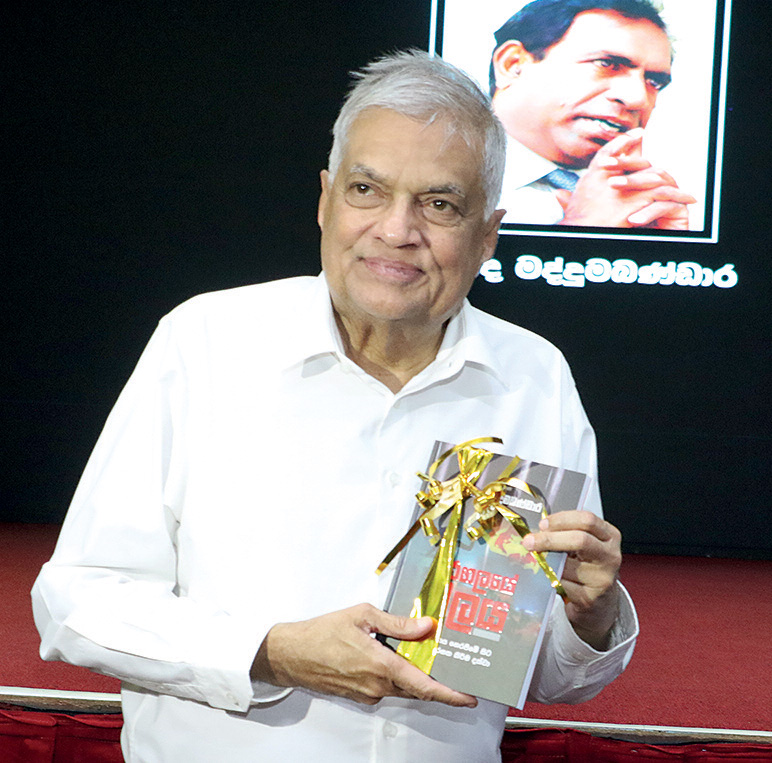
Ex-President Wickremesinghe with a copy of Aragalaye Balaya he received from its author, Prof. Professor Sunanda Maddumabandara, at the Sri Lanka Foundation recently (pic by Nishan S Priyantha)
On the basis of what Abeywardena had disclosed to him, Maddumabanadara also questioned the circumstances of the deployment of the elite Special Task Force (STF) contingent at the compound. The author asked whether that deployment, without the knowledge of the Speaker, took place with the intervention of Baglay.
Aragalaye Balaya
is a must read for those who are genuinely interested in knowing the unvarnished truth. Whatever the deficiencies and inadequacies on the part of the Gotabaya Rajapaksa administration, external powers had engineered a change of government. The writer discussed the issues that had been raised by Prof. Maddumabandara and, in response to one specific query, the author asserted that in spite of India offering support to Gotabaya Rajapaksa earlier to get Ranil Wickremesinghe elected as the President by Parliament to succeed him , the latter didn’t agree with the move. Then both the US and India agreed to bring in the Speaker as the Head of State, at least for an interim period.
If Speaker Abeywardena accepted the offer made by India, on behalf of those backing the dastardly US backed project, the country could have experienced far reaching changes and the last presidential election may not have been held in September, 2004.
After the conclusion of his extraordinary assignment in Colombo, Baglay received appointment as New Delhi’s HC in Canberra. Before Colombo, Baglay served in Indian missions in Ukraine, Russia, the United Kingdom, Nepal and Pakistan (as Deputy High Commissioner).
Baglay served in New Delhi, in the office of the Prime Minister of India, and in the Ministry of External Affairs as its spokesperson, and in various other positions related to India’s ties with her neighbours, Europe and multilateral organisations.
Wouldn’t it be interesting to examine who deceived Weerawansa and Thoradeniya who identified US Ambassador Chung as the secret visitor to the Speaker’s residence. Her high-profile role in support of the project throughout the period 31 March to end of July, 2022, obviously made her an attractive target but the fact remains it was Baglay who brought pressure on the then Speaker. Mahinda Yapa Abeywardena’s clarification has given a new twist to “Aragalaya’ and India’s diabolical role.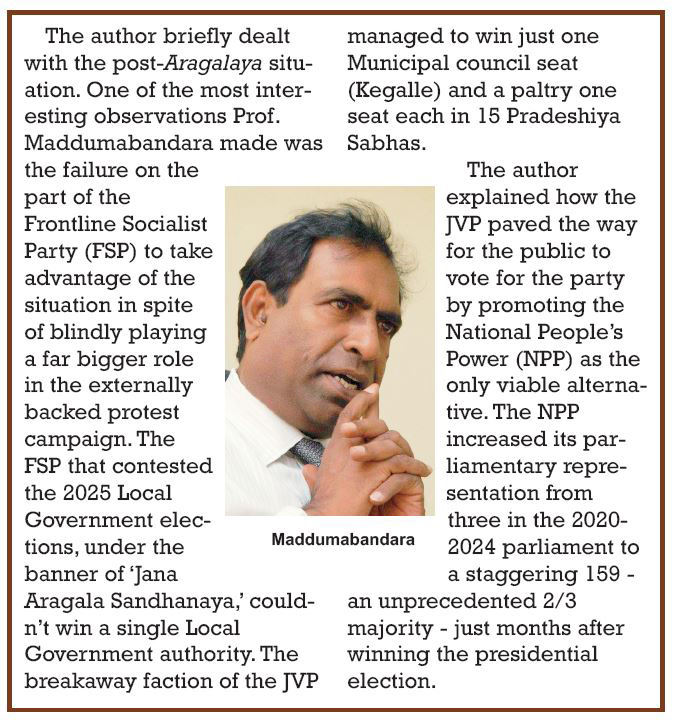
Absence of investigations
Sri Lanka never really wanted to probe the foreign backed political plot to seize power by extra-parliamentary means. Although some incidents had been investigated, the powers that be ensured that the overall project remained uninvestigated. In fact, Baglay’s name was never mentioned regarding the developments, directly or indirectly, linked to the devious political project. If not for Prof. Maddumabandara taking trouble to deal with the contentious issue of regime change, Baglay’s role may never have come to light. Ambassador Chung would have remained the target of all those who found fault with US interventions. Let me be clear, the revelation of Baglay’s clandestine meeting with the Speaker didn’t dilute the role played by the US in Gotabaya Rajapaksa’s removal.
If Prof. Maddumabandara propagated lies, both the author and Abeywardana should be appropriately dealt with. Aragalaye Balaya failed to receive the desired or anticipated public attention. Those who issue media statements at the drop of a hat conveniently refrained from commenting on the Indian role. Even Abeywardena remained silent though he could have at least set the record straight after Ambassador Chung was accused of secretly meeting the Speaker. Abeywardena could have leaked the information through media close to him. Gotabaya Rajapaksa and Ranil Wickremesinghe, too, could have done the same but all decided against revealing the truth.
A proper investigation should cover the period beginning with the declaration made by Gotabaya Rajapaksa’s government, in April 2022, regarding the unilateral decision to suspend debt repayment. But attention should be paid to the failure on the part of the government to decide against seeking assistance from the International Monetary Fund (IMF) to overcome the crisis. Those who pushed Gotabaya Rajapaksa to adopt, what they called, a domestic solution to the crisis created the environment for the ultimate collapse that paved the way for external interventions. Quite large and generous Indian assistance provided to Sri Lanka at that time should be examined against the backdrop of a larger frightening picture. In other words, India was literally running with the sheep while hunting with the hounds. Whatever the criticism directed at India over its role in regime change operation, prompt, massive and unprecedented post-Cyclone Ditwah assistance, provided by New Delhi, saved Sri Lanka. Rapid Indian response made a huge impact on Sri Lanka’s overall response after having failed to act on a specific 12 November weather alert.
It would be pertinent to mention that all governments, and the useless Parliament, never wanted the public to know the truth regarding regime change project. Prof. Maddumabandara discussed the role played by vital sections of the armed forces, lawyers and the media in the overall project that facilitated external operations to force Gotabaya Rajapaksa out of office. The author failed to question Wickremesinghe’s failure to launch a comprehensive investigation, with the backing of the SLPP, immediately after he received appointment as the President. There seems to be a tacit understanding between Wickremesinghe and the SLPP that elected him as the President not to initiate an investigation. Ideally, political parties represented in Parliament should have formed a Special Parliamentary Select Committee (PSC) to investigate the developments during 2019 to the end of 2022. Those who had moved court against the destruction of their property, during the May 2022 violence directed at the SLPP, quietly withdrew that case on the promise of a fresh comprehensive investigation. This assurance given by the Wickremesinghe government was meant to bring an end to the judicial process.
When the writer raised the need to investigate external interventions, the Human Rights Commission of Sri Lanka (HRCSL) sidestepped the issue. Shame on the so-called independent commission, which shows it is anything but independent.
Sumanthiran’s proposal
Since the eradication of the Liberation Tigers of Tamil Eelam (LTTE) in May 2009, the now defunct Tamil National Alliance’s (TNA) priority had been convincing successive governments to withdraw the armed forces/ substantially reduce their strength in the Northern and Eastern Provinces. The Illankai Thamil Arasu Kadchi (ITAK)-led TNA, as well as other Tamil political parties, Western powers, civil society, Tamil groups, based overseas, wanted the armed forces out of the N and E regions.
Abeywardena also revealed how the then ITAK lawmaker, M.A. Sumanthiran, during a tense meeting chaired by him, in Parliament, also on 13 July, 2022, proposed the withdrawal of the armed forces from the N and E for redeployment in Colombo. The author, without hesitation, alleged that the lawmaker was taking advantage of the situation to achieve their longstanding wish. The then Speaker also disclosed that Chief Opposition Whip Lakshman Kiriella and other party leaders leaving the meeting as soon as the armed forces reported the protesters smashing the first line of defence established to protect the Parliament. However, leaders of minority parties had remained unruffled as the situation continued to deteriorate and external powers stepped up efforts to get rid of both Gotabaya Rajapaksa and Ranil Wickremesinghe to pave the way for an administration loyal and subservient to them. Foreign powers seemed to have been convinced that Speaker Abeywardena was the best person to run the country, the way they wanted, or till the Aragalaya mob captured the House.
The Author referred to the role played by the media, including social media platforms, to promote Gotabaya Rajapaksa’s successor. Maddumamabandara referred to the Hindustan Times coverage to emphasise the despicable role played by a section of the media to manipulate the rapid developments that were taking place. The author also dealt with the role played by the Janatha Vimukthi Peramuna (JVP) in the project with the focus on how that party intensified its actions immediately after Gotabaya Rajapaksa stepped down.
Disputed assessment
The Author identified Ministers Bimal Rathnayaka, Sunil Handunetti and K.D. Lal Kantha as the persons who spearheaded the JVP bid to seize control of Parliament. Maddumabanda unflinchingly compared the operation, mounted against Gotabaya Rajapaksa, with the regime change operations carried out in Iraq, Libya, Egypt and Ukraine. Asserting that governments loyal to the US-led Western block had been installed in those countries, the author seemed to have wrongly assumed that external powers failed to succeed in Sri Lanka (pages 109 and 110). That assertion is utterly wrong. Perhaps, the author for some unexplained reasons accepted what took place here. Nothing can be further from the truth than the regime change operation failed (page 110) due to the actions of Gotabaya Rajapaksa, Mahinda Yapa Abeywardana and Ranil Wickremesinghe. In case, the author goes for a second print, he should seriously consider making appropriate corrections as the current dispensation pursues an agenda in consultation with the US and India.
The signing of seven Memorandums of Understanding (MoUs) with India, including one on defence, and growing political-defence-economic ties with the US, have underscored that the JVP-led National People’s Power (NPP) may not have been the first choice of the US-India combine but it is certainly acceptable to them now.
The bottom line is that a democratically elected President, and government, had been ousted through unconstitutional means and Sri Lanka meekly accepted that situation without protest. In retrospect, the political party system here has been subverted and changed to such an extent, irreparable damage has been caused to public confidence. External powers have proved that Sri Lanka can be influenced at every level, without exception, and the 2022 ‘Aragalaya’ is a case in point. The country is in such a pathetic state, political parties represented in Parliament and those waiting for an opportunity to enter the House somehow at any cost remain vulnerable to external designs and influence.
Cyclone Ditwah has worsened the situation. The country has been further weakened with no hope of early recovery. Although the death toll is much smaller compared to that of the 2004 tsunami, economic devastation is massive and possibly irreversible and irreparable.
By Shamindra Ferdinando
Features
Radiance among the Debris
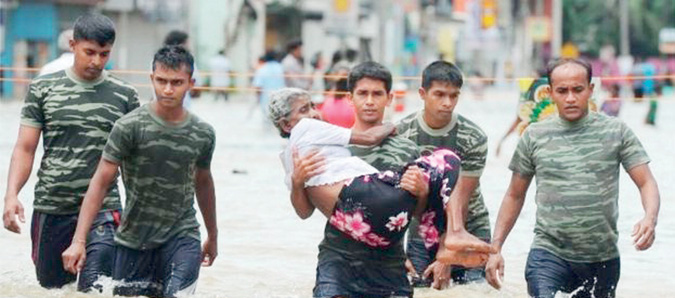
Over the desolate watery wastes,
Dulling the glow of the fabled Gem,
There opens a rainbow of opportunity,
For the peoples North and South,
To not only meet and greet,
But build a rock-solid bridge,
Of mutual help and solidarity,
As one undivided suffering flesh,
And we are moved to say urgently-
‘All you who wax so lyrically,
Of a united nation and reconciliation,
Grab this bridge-building opportunity.’
By Lynn Ockersz
-

 News4 days ago
News4 days agoOver 35,000 drug offenders nabbed in 36 days
-

 Features2 days ago
Features2 days agoFinally, Mahinda Yapa sets the record straight
-

 Business6 days ago
Business6 days agoLOLC Finance Factoring powers business growth
-

 News3 days ago
News3 days agoCyclone Ditwah leaves Sri Lanka’s biodiversity in ruins: Top scientist warns of unseen ecological disaster
-

 News6 days ago
News6 days agoCPC delegation meets JVP for talks on disaster response
-

 News6 days ago
News6 days agoA 6th Year Accolade: The Eternal Opulence of My Fair Lady
-

 News4 days ago
News4 days agoRising water level in Malwathu Oya triggers alert in Thanthirimale
-
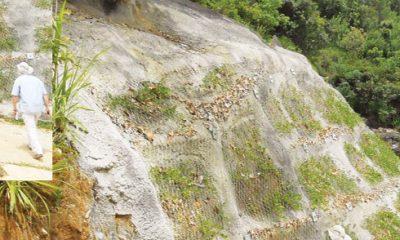
 Features5 days ago
Features5 days agoThe Catastrophic Impact of Tropical Cyclone Ditwah on Sri Lanka:













